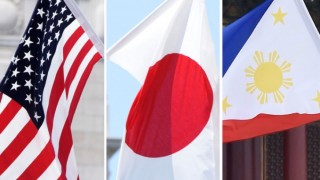Loading
Search
▼ Japan, Philippines, U.S. To Set Up 3-Way Security Framework
- Category:Other
Japan, the Philippines and the United States plan to set up a trilateral framework involving their national security advisers, officials familiar with the matter said recently, amid China's growing military assertiveness in the Indo-Pacific region.
Their first discussions under the new scheme may take place as early as April, Eduardo Ano, security adviser to Philippine President Ferdinand Marcos Jr., told Kyodo News. Ano said he is "willing to attend" the meeting although details, including which country will host the talks, remain fluid.
An aide to Ano separately disclosed on Friday that the proposal to initiate a three-way security dialogue was put forward by Japan which, with the United States, believes that forging closer ties with the Philippines is essential for boosting deterrence against China and preparing for a potential crisis over Taiwan.
White House National Security Adviser Jake Sullivan and his Japanese counterpart Takeo Akiba are expected to be the two other representatives at the envisioned meeting, according to a U.S. government source.
Another U.S. government source said the trilateral meeting is likely to take place after the United States and the Philippines hold security talks involving their foreign and defense ministers in Washington on April 11.
The so-called two-plus-two talks between the two countries will be convened for the first time since January 2016, signaling that the Marcos administration continues to pursue a different foreign policy approach from his predecessor, Rodrigo Duterte.
Duterte, who held office for six years until June 2022, repeatedly threatened to sever the Philippines' longtime security ties with the United States and often ignored China's illegal incursions in the South China Sea.
China claims almost all of the South China Sea, but the Philippines, several other Southeast Asian countries and Taiwan have overlapping claims with Beijing.
China disregards a 2016 international tribunal ruling that invalidated its territorial claims to the area. Japan, which has been seeking to counter China's assertion of sovereignty over the Senkaku Islands in the East China Sea, is a U.S. treaty ally, alongside the Philippines.
The Philippines seeks the support of Japan and the United States over a territorial dispute in the South China Sea, but it is also cautious about relying too much on the two countries.
Marcos has made it clear that his administration will not seek to embrace a "Cold War mindset," saying his country's foreign policy will be independent and will not choose a side between Beijing and Washington.
Japanese and U.S. officials, meanwhile, want to expand the framework beyond dialogue to trilateral defense cooperation and exercises in the near future.
The U.S. government has assessed that China could take military action against Taiwan, which it considers part of its territory, by 2027 when Xi Jinping's third term as leader of the Communist Party ends.
As China's behavior toward Taiwan becomes increasingly assertive, Japan and the United States regard the Philippines, a country located near important sea lanes and the self-ruled democratic island, as strategically important for maintaining peace and stability in the region.
Despite seeking to avoid being caught in the intensifying rivalry between China and the United States, the Philippines has adopted a more resolute stance in recent months against Beijing.
In February, the president granted the U.S. access to four more military bases, raising the number American soldiers can use in the Philippines to nine.
He also summoned China's ambassador to Manila following an incident involving a Chinese coast guard vessel shining a powerful laser at one of its ships in the contested waters.
- March 29, 2023
- Comment (0)
- Trackback(0)


